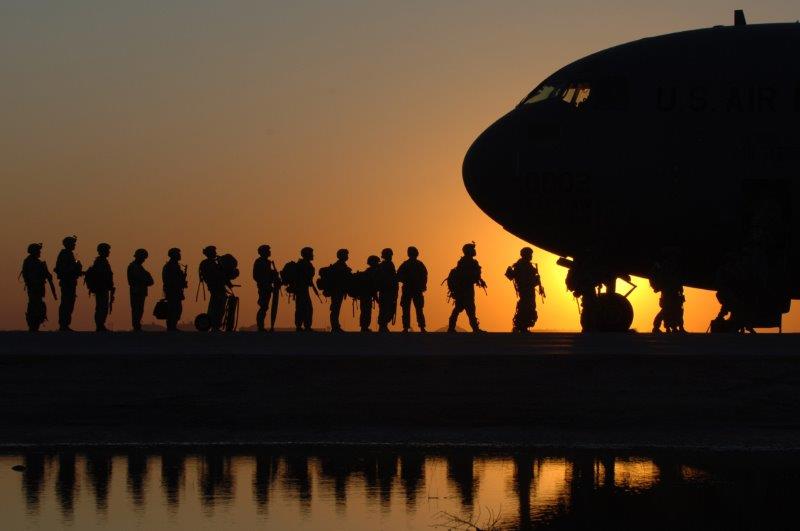The news is buzzing with talks of a potential government shutdown. This is never an ideal situation, but especially concerning when it comes to our national security and the people who protect it - the military.
Shutdowns create a ripple effect that touches military pay and benefits, day-to-day operations, personnel, healthcare, and so much more. And the disruptions cause problems that can last long after the government reopens its doors.
Understanding the realities of a shutdown is key to preparing yourself and your family. This guide breaks down exactly what happens when the military funding dries up, how you can get through it, and what happens when the dust finally settles. Let’s dig in.
Key Takeaways:
- Military pay is affected, leading to delayed paychecks for active duty, reservists, and civilians. Retirees and annuitants continue receiving pensions.
- Daily operations ranging from training exercises to recruiting grind to a halt without funding and personnel.
- Commissaries, healthcare facilities, and other services operate at reduced capacity or close down completely.
- Military families need backup plans for healthcare, childcare, and managing finances to get through a shutdown period.
- Morale, welfare, retention numbers, and readiness suffer both during and after a shutdown. The effects can linger for years.
Military Pay and Benefits During a Government Shutdown
A lapse in government funding means operations run without new money authorized by Congress. And that leads to some major changes in what the military can provide in terms of pay and benefits.

Delayed Paychecks and Benefit Payments
One of the most immediate effects is delayed pay for military personnel. Troops on active duty and reservists who drill on weekends rely on their paychecks to cover the necessities of life. But with no budget passed, that biweekly income is put on pause.
Congress could authorize emergency funding specifically for military pay. This has happened during past shutdowns. But there is no guarantee as political battles rage on.
That leaves families scrambling to cover costs. Expenses don’t stop just because pay is delayed. Military families still need to buy groceries, pay for childcare, handle the mortgage and bills. A shutdown stretching longer than a pay period or two can drain emergency savings in a hurry.
Other benefits are caught up in the funding limbo as well. New disability claims processed through the VA typically take 30-90 days for a decision. A shutdown means claims processors sent home, adding more delays.
Financial Assistance Programs
Some options do exist to ease the financial squeeze of lost paychecks during a shutdown.
Banks and credit unions may offer low or no-interest loans, penalty-free early withdrawals from certificates of deposits, and other assistance. Reach out to your financial institution to learn about possible programs.
Military aid organizations are another great resource. Organizations like the Navy-Marine Corps Relief Society or Air Force Aid Society offer interest-free loans or grants to cover emergency needs.
Food pantries, childcare assistance, temporary job networks, and other local programs can also provide relief for struggling military families during a shutdown.
The key is knowing your options and making a plan before the budget battle begins. Don’t wait until you’ve missed a paycheck or two - that only adds stress and limits your choices.
Reduced Personnel and Readiness When the Government Shuts Down
Daily military operations don’t pause for political disagreements. But they do suffer cutbacks and complications that impact readiness and capabilities.

Furloughs for Civilian Employees
Roughly 50% of the Pentagon’s 800,000 civilian workforce is designated as “nonessential” personnel. These employees in administrative, management, and other roles are placed on emergency furlough.
Furloughs mean these civilians don’t come to work or get paid for the duration of the shutdown. For some living check to check, even a brief furlough of 2-3 weeks can spell financial disaster.
Having half your normal workforce instantly vanish is hugely disruptive for the military. Drained resources mean longer turnaround times, delays in getting supplies, and reduced services for active duty members.
Project timelines get extended as the remaining half of civilians take on more roles. Backlogs of requests and administrative work pile up waiting for furloughed staff to return.
And furloughed civilians aren’t the only ones taking on extra - active duty and reserve members have to fill gaps as well. Their operational duties continue without the full support staff civilians provide.
Paused Training and Recruiting
Two key areas that quickly suffer during a shutdown are training and recruiting operations.
Bottom line, if funding stops, so does most training. Fuel supplies needed for aircraft maneuvers and ship operations aren’t purchased without a budget. Contracts to maintain gear and equipment are stalled waiting for new fiscal years funds.
Ongoing training courses and exercises are put on hold or canceled altogether. This results in lost training time that can’t be recovered. Troops miss out on developing and honing vital combat and operational skills.
Recruiting also hits major roadblocks during a shutdown. Offices stand empty with no staff or funding for operations. Outreach events are canceled. Advertising budgets frozen.
The results are dismal recruitment numbers at a time when military branches already struggle to meet quotas. Efforts to reengage with desired demographics are completely derailed.
Closed Services and Facilities
Daily life on military bases transforms during a shutdown. Many services and facilities military families rely on shut down or scale back operations.

Commissaries and Exchanges
Commissaries are grocery stores that offer discounted prices to military families. All stateside commissaries are required to close during a funding lapse.
That means families accustomed to saving 30% or more on groceries suddenly pay full price at civilian stores. Overseas commissaries continue operating with limited staff. But shelves often empty faster with fewer deliveries arriving.
Luckily, the military exchanges remain open during a shutdown. These on-base department stores offering tax-free shopping are more prepared to operate without government funding.
However, hours may be reduced as staffing decreases. And certain departments like furniture (considered non-essential) may temporarily close. Expect shipping delays as distribution centers have smaller crews.
Childcare and Schools
Childcare is a huge question for military families during shutdowns. CDC facilities on bases often close until funding returns.
That leaves parents scrambling to find temporary care for little ones. Hourly daycares quickly fill so reservations are crucial. If multiple kids are at home, tag-teaming care between parents may work best.
DOD schools both stateside and overseas continue operating during shutdowns. However, some after-school programs, sports, and specialty classes may be cut. Mostly normal school days continue, but field trips and non-essential activities are shelved.
Preparing Military Families for a Government Shutdown Without Pay
When paychecks are on pause and life on base disrupted, prepping your family is essential. Take these steps to navigate a shutdown smoothly:

Creating a Backup Budget
Loss of a paycheck - or two, or three - means your normal budget won’t work. Make a new plan based on emergency funds and assistance options.
Get nitty gritty on what’s needed versus wanted. Food, shelter, utilities come first. Extras like dining out, leisure activities, and impulse purchases go on the back burner.
If pay disruption looks lengthy, contact lenders right away. See if loans, payment reductions, or deferments are available. Act before payments are missed to avoid penalties or hits to your credit.
Share the realities of your backup budget with kids. Make shutdown preparations a family affair so everyone understands changes.
Tapping into Emergency Funds
An emergency savings account helps weather unexpected crises - prime example being a government shutdown!
Ideally savings cover 3-6 months of basic living costs. If not, use what’s available to pay only true necessities during a shutdown. Let kiddos help brainstorm how to stretch dollars from your savings fund.
Retirement accounts allow early withdrawals in times of financial hardship. But this should be a last resort given taxes and penalties.
Seeking Relief from Creditors
If savings can’t cover costs, ask creditors for temporary relief. Explain the situation and request options like waived late fees, reduced minimum payments, or payment deferrals.
Only reach out to creditors you absolutely must pay immediately - mortgage/rent, utilities, etc. Hold off nonessentials like credit cards and other loans until you get backpay.
The Lasting Impacts of a Shutdown
Government shutdowns hurt military families, preparedness, and progress in both short and long term ways. Some effects dissipate quickly when a budget passes, but not all.

Morale and Welfare Declines
Financial strain, isolation, uncertainty, and stress plague military families during a shutdown. Kids left home from closed daycares, spouses juggling work with increased caregiver duties, household budgets busted - it all takes a toll.
These compounding stresses break down morale and welfare. Troops carrying out duties without the benefits of pay question why their needs aren't prioritized. Feelings of under-appreciation and being undervalued emerge.
Hardships endured during a shutdown stick with families for years. And memories of sacrifices made fade slower for military members than politicians.
Recruitment and Retention Challenges
Shutdowns provide concrete examples of the military's precarious status within wider politics. Continual funding conflicts demonstrate how little control troops have over pay reliability.
These vulnerabilities dissuade potential recruits who see too much uncertainty. Why join an organization that can’t guarantee a paycheck?
For those already serving, doubts creep in about re-enlisting if shutdowns continue recurring. The toll on family life may outweigh pride in serving one's country.
Both these dynamics worsen the military's already struggling efforts to attract and retain talent. Shutdowns have a gradual "death by a thousand cuts" weakening effect.
Long-Term Readiness Issues
Readiness relies on consistent training, well-staffed operations, and smoothly running facilities. Shutdown disruptions undermine all of these foundations.
The skills troops hone through rigorous training erode without regular practice and exercises. Coordinating large-scale operations becomes harder with fewer seasoned planners available. Facilities decline without standard maintenance and repairs.
These setbacks accumulate like rust, gradually degrading readiness across the military. And degraded readiness means forces aren't truly prepared for combat operations if conflicts arise.
Getting capabilities back to full strength after shutdowns requires months and years of retraining personnel, refining tactics, and rehabilitating infrastructure. Each shutdown chips away harder at military readiness.
Conclusion? Keep the Government Open
Whenever talks of a government shutdown arise, there is a lot of discussion around efforts to keep the government open and avoid a shutdown. Members of congress including the house and senate need to negotiate and compromise to pass a spending bill to fund the government agencies long-term and avert disruptions and avoid a government shutdown.
If they cannot agree on a funding bill before money runs out, many vital government services could be impacted. A shutdown would likely force closures of national parks and furlough hundreds of thousands of government employees.
Critical services like Social Security, air traffic control, and the transportation security administration may continue but still face challenges in a prolonged shutdown. Federal agencies across the country would be affected, leading to wide-ranging issues.
In the final hours, leaders often scramble to fund essential agencies to keep air traffic controllers and other workers on duty. Passing last-minute bills to keep select agencies operating helps, but does not prevent all the troubles a full shutdown would bring.
Let's hope that through bipartisan negotiation and compromise, politicians can regularly pass full funding bills to keep the U.S. government running smoothly. Our nation relies on many important federal programs, and shutdowns would bring severe and widespread disruptions.

Frequently Asked Questions
How soon could military paychecks be delayed in a shutdown?
Most branches issue pay around the 1st and 15th of each month. If a shutdown begins October 1st and continues through the 14th, that mid-month check would be affected.
Do active duty troops continue working without pay during a shutdown?
Yes, protecting national security remains the military's duty regardless of budget disputes in Washington. Active duty members are expected to carry on their missions and assignments as normal even without pay.
Can furloughed civilians file for unemployment benefits?
Yes, furloughed civilians can file for unemployment compensation through their state workforce agencies. However, these benefits would have to be repaid if Congress later approves backpay for furloughed workers.
Do VA medical services remain running during a shutdown?
VA facilities stay fully staffed and operational during a shutdown to continue caring for veteran health needs. However, new enrollments and some elective procedures may be postponed.
Will tuition assistance programs continue for military students?
No. Tuition assistance programs are suspended during a shutdown. Students must either pay their school bills directly or work with academic advisors on options to pause enrollments.
Are Permanent Change of Station (PCS) moves still allowed?
Most relocations are halted during a shutdown unless funded by a previous fiscal year's budget. Exceptions can be granted for mission-essential PCS moves with approval from higher authorities.
How long do shutdowns generally last?
In recent years, shutdowns have ranged from a single day up to 35 days until the government shutdown ended. The 2013 shutdown resulted in a 16-day shutdown, while the December 2018 and January 2019 shutdown lasted 35 days.
How does a government shutdown affect first responders?
Shutdowns can delay critical funding and resources for first responder training, equipment, and daily operations, while also resulting in paycheck instability and loss of federal support systems that local agencies rely on.











